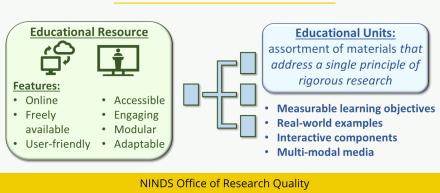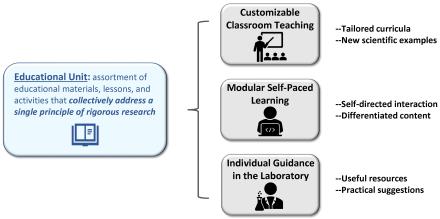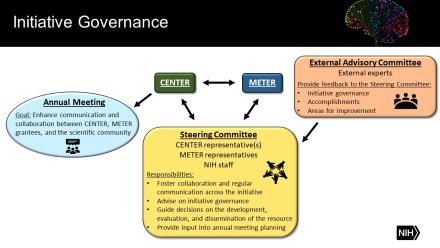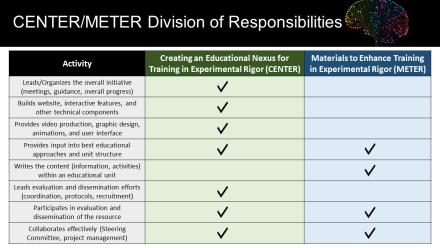In 2022, NINDS funded the first awards for what has become known as the Community for Rigor (C4R) educational resource initiative. The purpose of this initiative is to improve training in the principles of rigorous research by developing an online educational platform that will serve the scientific community.
This initiative is driven by awardees of two companion Notices of Funding Opportunities (NOFOs): Creating an Educational Nexus for Training in Experimental Rigor (CENTER) and Materials to Enhance Training in Experimental Rigor (METER). The CENTER, awarded to the University of Pennsylvania, is responsible for administrative oversight of the initiative and for building, evaluating, and disseminating a user-friendly, harmonized, and openly accessible educational resource to promote awareness, understanding, and utilization of the principles of rigorous biomedical research. They have named the overall initiative "Community for Rigor", or C4R. Multiple cohorts of METER awardees are responsible for drafting the core scholarly content of educational units within the online resource and ensuring their utility for a broad range of researchers in an array of learning environments. See the figure below for a depiction of this structure.

Frequently Asked Questions (FAQs)
General Information
What is the purpose of this initiative?
Many biomedical publications do not transparently report complete methodologies, analyses, and measures taken at various stages of the research project to ensure rigor and minimize risks of bias (see Research Culture: Framework for Advancing Rigorous Research for more information). This lack of transparency in reporting, and potential lack of practice, may contribute to difficulties in building upon research findings and has been partially attributed to incomplete training in the principles of rigorous research. These two Notices of Funding Opportunity (NOFOs) together aim to facilitate teaching of fundamental principles of rigorous biomedical research by developing a new online educational resource for use by a broad range of researchers in an array of learning environments. Creating an Educational Nexus for Training in Experimental Rigor (CENTER) (UC2 Clinical Trial Not Allowed) supports a Center to build the online educational resource for training in experimental rigor. Materials to Enhance Training in Experimental Rigor (METER) (UE5 Clinical Trial Not Allowed) supports subject matter experts to provide educational materials to the CENTER in order to integrate them into the online educational resource for training in experimental rigor.
Which awards have already been funded?
The initiative launched on August 1, 2022. The single CENTER and four cohorts of METER have been awarded. See below to learn more about the awardees. You may also follow the resource's progress at c4r.io.
Creating an Educational Nexus for Training in Experimental Rigor (CENTER)
The Principal Investigator for the CENTER award is Konrad Kording from the University of Pennsylvania. See NIH RePORTER for more information about the award.
Materials to Enhance Training in Experimental Rigor (METER)
The Principal Investigators for the 4 cohorts of METER awards are listed below. See NIH RePORTER for more information about these awards.
Cohort 1 (Started August 1, 2022)
- Richard Born and Taralyn Tan, Harvard Medical School
- Gundula Bosch, Johns Hopkins University
- Michael Gionfriddo and Jordan Covvey, Duquesne University
- Mary Harrington, Smith College
Cohort 2 (Started August 1, 2023)
- Carl Bergstrom, University of Washington
- Sara Gombash Lampe, The Ohio State University
- Benedict Kolber, Salena Brody, and Regina Ybarra, University of Texas at Dallas
- Mark Kramer and Uri Eden, Boston University
Cohort 3 (Started August 1, 2024)
- Alexandra Hanlon, Virginia Tech University
Cohort 4 (Started August 1, 2025)
- Nafisa Jadavji, Southern Illinois University Carbondale
Where can I find videos and articles about the initiative?
- 2025 Annual C4R Meeting
- 2022 NINDS Director's Message
- 2022 NINDS Press Release
- 2021 Informational Webinar
- 2021 Initiative Video by NINDS Staff
- 2021 NINDS Director's Message
- 2020 NINDS Concept Clearance
Who is the audience for this new educational resource? In what environment(s) could it be used?
Biomedical researchers across various disciplines and career stages will be able to use the educational units easily and effectively, including undergraduate, graduate, postdoctoral, and independent researchers. The online resource will be adaptable to different educational settings, including utilization as part of lectures or laboratory meetings, independently performed problem-based coursework, and individual pursuit of practical advice while in the laboratory. A key feature of the resource will be its customizability by users to create individualized curricula containing a subset of educational units and to select differentiated levels of information detail and depth based on learning goals. Individual users should be able to specify the exact units, modes of learning, and individual components with which they would like to engage. Additionally, educators should be able to compile individual educational units into customized curricula, choose which subsets of content or tools they would like to use in their classrooms, and personalize scientific examples to increase relevance to their students. You may follow the resource's progress at c4r.io.

What are “principles of rigorous biomedical research”?
Principles of rigorous biomedical research are cross-cutting concepts, processes, and practices that promote rigorous, transparent, and robust scientific experiments. These principles apply across a wide variety of scientific disciplines, techniques, and approaches. NIH defines scientific rigor as “the strict application of the scientific method to ensure robust and unbiased experimental design, methodology, analysis, interpretation and reporting of results. NIH expects full transparency in proposing and reporting experimental details so that reviewers may assess the proposed research and others may reproduce and extend the findings.” A list of practices being developed can be found on the C4R website. Additional examples of high-priority principles of rigorous research for NINDS can be found here.
What is an "educational unit"?
For the purpose of this initiative, an educational unit is defined as an assortment of educational materials, lessons, and activities that collectively address a single principle of rigorous research (i.e., one principle per educational unit). Each educational unit will be independently incorporated into the online resource by CENTER. It is estimated that one educational unit, at its maximal breadth and depth of material, will provide the equivalent of one week of instructional material if used as part of a traditional undergraduate or graduate course, although real-world users will also be able to select short, individual components of the unit with which to interact (e.g., a single 5-minute video, set of step-by-step instructions, or package for presenting at laboratory meetings). Each unit should contain effective and engaging educational components, including measurable and attainable learning objectives, a broad and deep overview of the principle of rigorous research, guidance on why and how to apply the principle, complex and realistic neuroscience-relevant scientific examples, interactive components, effective multi-media (e.g., text, videos, graphics, animations), instructional supports for diverse learners, and additional resources.
How many educational units/principles of rigorous research will the resource host?
CENTER is expected to incorporate 30-50 total educational units into the online resource by the end of the project.
CENTER
What is the purpose of CENTER? What does the CENTER do?
The CENTER is being led by Konrad Kording from the University of Pennsylvania. This CENTER will build, evaluate, and disseminate the user-friendly, harmonized, and openly accessible educational resource to promote awareness, understanding, and utilization of the principles of rigorous biomedical research. CENTER is responsible for providing comprehensive administrative oversight, expertise required to establish and maintain the educational platform, and infrastructure to create cutting-edge digital educational components (e.g., videos, interactive activities, relevant scientific examples). These components are being adapted from content provided by subject matter experts supported by the companion METER NOFO. CENTER is assembling and managing a team of platform developers, specialists in creating and evaluating engaging digital content, and experts in pedagogy and educational techniques in order to carry out these CENTER activities. CENTER will create, evaluate, modify, disseminate, and maintain the educational resource’s digital platform and coordinate collaborations between the external subject matter experts providing the scholarly content, champions of rigor in the scientific community, and CENTER’s technical and educational experts ensuring high-quality educational delivery and impact. You may follow the CENTER's progress at c4r.io.
How do the Steering Committee and External Advisory Committee work for this initiative?
The Steering Committee meets regularly to facilitate effective collaboration among CENTER and METER awardees, assist in annual meeting planning, help set the scope of the educational resource, provide guidance on CENTER governance and implementation, and ensure the production, evaluation, and dissemination of a harmonized and high-quality educational resource. The Steering Committee includes at least one individual each from CENTER, NINDS staff, and the METER awards. The External Advisory Committee meets less often and provides the CENTER and Steering Committee guidance and feedback on activities, accomplishments, and areas for improvement. The External Advisory Committee includes individuals with relevant scientific, education, evaluation, and technical expertise who are not funded by CENTER or METER awards.

What will happen to CENTER and the resource at the end of the funding period?
Next steps after the end of the funding period will depend upon the evolving organization and success of the initiative.
METER
What is the purpose of this NOFO? What does a METER do?
The purpose of this NOFO is to support the compilation and refinement of educational units on principles of rigorous research, which comprise the core scholarly content of the online resource. These materials should enable acquisition of knowledge and skills to recognize and conduct rigorous experimental research. METER awardees serve as the primary subject matter experts for one or more educational unit(s) focused on individual principles of rigorous research and provide the scholarly material to CENTER, which is supported by a separate NOFO to build the final web-based platform and produce digital elements for the online resource that are beyond the technical capabilities of METER awardees (e.g., interface, graphics, interactive components).
Where is the line between CENTER and METER, and who leads each activity?
CENTER provides overall leadership to the project. This requires project management of educational resource development, creation of the free online platform that contains multiple educational units on principles of rigorous biomedical research, coordination of appropriate expertise for each component of the resource, and collaboration with a range of stakeholders. This includes coordinating Steering Committee and External Advisory Committee meetings, leading resource evaluation and dissemination efforts, and hosting the annual meetings. METER awardees, on the other hand, serve as the primary subject matter experts for one or more educational unit(s) focused on individual principles of rigorous research and provide scholarly material to CENTER for conversion into digital educational units. CENTER is responsible for harmonization across the platform, including the educational units, and for producing multi-modal, effective, and engaging content delivery. CENTER provides educational expertise to guide METER awardees during development of their materials to ensure both harmonization across the resource and optimal educational effectiveness. METER awardees ensure accuracy and efficacy of the digital learning materials produced by CENTER and recommend modifications as necessary. After the educational units are refined enough to begin formal evaluation, METER awardees participate in evaluation and dissemination efforts organized by CENTER as agreed upon by the Steering Committee. All of these activities are performed under the collaborative guidance of the Steering Committee, which consists of CENTER representation, METER awardees, and NIH staff. To use a loose film analogy, during resource development CENTER will function like a producer and director while METER awardees will function like script writers and editors. Collaboration between each of these entities is vital for the project to succeed.

How are the variety of ideas and approaches proposed between CENTER and multiple METER awards harmonized and integrated?
CENTER is responsible for harmonization across the platform, including the educational units, which ensures functionality, seamless navigation among related units, effective user experiences, and uniform appearance and organization. CENTER provides overall project leadership, governance, and oversight, including through effective conflict resolution, and it is vital that CENTER forge successful collaborations with METER awardees in order to create the educational units. METER awardees, however, are encouraged to contribute innovative ideas for consideration by CENTER and the Steering Committee. This process of harmonizing and integrating ideas occurs under the collaborative guidance of the Steering Committee, which consists of CENTER representation, METER awardees, and NIH staff.
